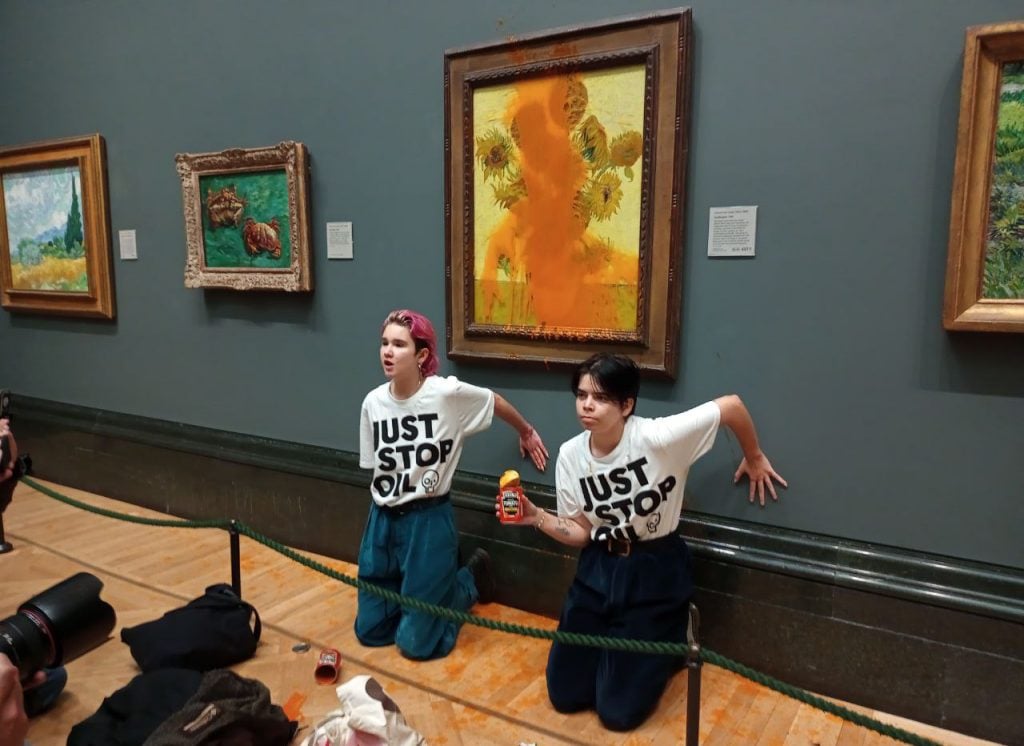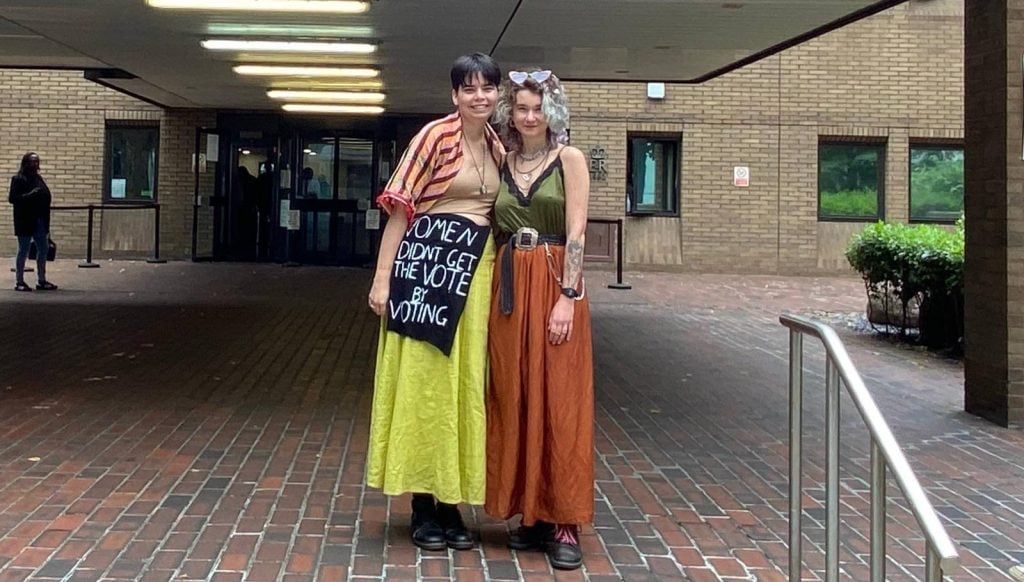Law & Politics
Climate Activists Who Threw Soup at Van Gogh’s ‘Sunflowers’ Found Guilty
They are scheduled to be sentenced in September.

They are scheduled to be sentenced in September.

Adam Schrader

The two Just Stop Oil activists who threw soup at a Vincent Van Gogh painting at the National Gallery in London in 2022 have been found guilty by a British judge.
The activists threw a can of tomato soup onto Sunflowers (1888), causing only minor damage to the frame of the painting, which was protected by glass and unharmed.
The activist group said in a July 25 statement that Phoebe Plummer and Anna Holland were found guilty of criminal damage exceeding £5,000 ($6,432).
“Is art worth more than life? More than food? More than justice?” said Plummer, 23, after the 2022 action. “The cost-of-living crisis is driven by fossil fuels—everyday life has become unaffordable for millions of cold hungry families—they can’t even afford to heat a tin of soup.”
Southwark Crown Court Judge Christopher Hehir warned them to expect jail time and scheduled sentencing for September 27. The National Gallery declined to comment.
The news came after the same judge sentenced the group’s founder, Roger Hallam, and four other activists—collectively referred to by the group as the “Whole Truth Five”—to between four and five years in prison.
“During that trial, he denied the defendants all defenses in law and barred any mention of the climate crisis, preventing them from giving testimony on their reasons for taking action,” the group said in its statement.
Similarly, in the trial of Plummer and Holland, Hehir characterized the throwing of soup as “violent” to dismiss their legal defense of “proportionality” under Article 10 of the Human Rights Act 1998.
“The judge seemed to not understand that acts considered violent against other humans may not be considered violent against inanimate objects,” the protest group said. Holland’s attorney indicated to the BBC that she intends to appeal the decision.

Phoebe Plummer and Anna Holland have been found guilty of public nuisance for throwing soup at a painting by Vincent Van Gogh. Photo courtesy of Just Stop Oil.
The strict sentencing for Hallam, paired with the guilty verdicts for Plummer and Holland, has caused a stir among British lawyers at large, who only agree on the unprecedented nature of recent climate change protests.
Adam Wagner, a human rights lawyer, wrote on X that the sentences for Hallam and his crew were “very long sentences indeed for peaceful, though highly disruptive, protests” that led to charges under the new statutory offense of causing public nuisance.
“There was a time, not long ago, where the courts were reluctant to give immediate prison sentences at all for civil disobedience. No more,” Wagner said.
Wagner noted that disruptive protest tactics have long been used by protest groups but suggested that British society’s tolerance for them “seems to have ended” as he questioned whether such sentences are a good use of prisons or would radicalize protesters.
Hallam, who also cofounded the Extinction Rebellion protest group, stood by his actions in a recorded message to the BBC from his prison cell, stating that he believed direct action protests remain “the right strategy” for the groups to bring about long-term change.
“The strategic moral imperative is resistance to the greatest [crisis] in the history of humanity,” Hallam said.
But some think the jail terms are deserved. Andrew Tettenborn, a professor of law at Swansea Law School, wrote an op-ed blasting Hallam’s brand of civil disobedience. “Those who say that the protesters are merely conscientious practitioners of civil disobedience, and that the punishments imposed amount to a stamping on the right of peaceful protest, are wrong,” Tettenborn wrote.
He argued that, throughout the Just Stop Oil case, there have been attempts to condone the group’s actions and “quietly to influence what should be an impartial judicial process.”
“Hallam’s casting of himself in the role of a civil disobedience advocate is both disingenuous and incorrect. Civil disobedience involves a willingness not only to disobey, but take the punishment,” Tettenborn argued.
But while the protesters assert their willingness to be arrested for their cause, one activist suggested to Socialist Worker that the British justice system is going above and beyond with penalizing them.
“I’ve been arrested six times in the last six months,” the activist said, “State repression is wild at the moment.”